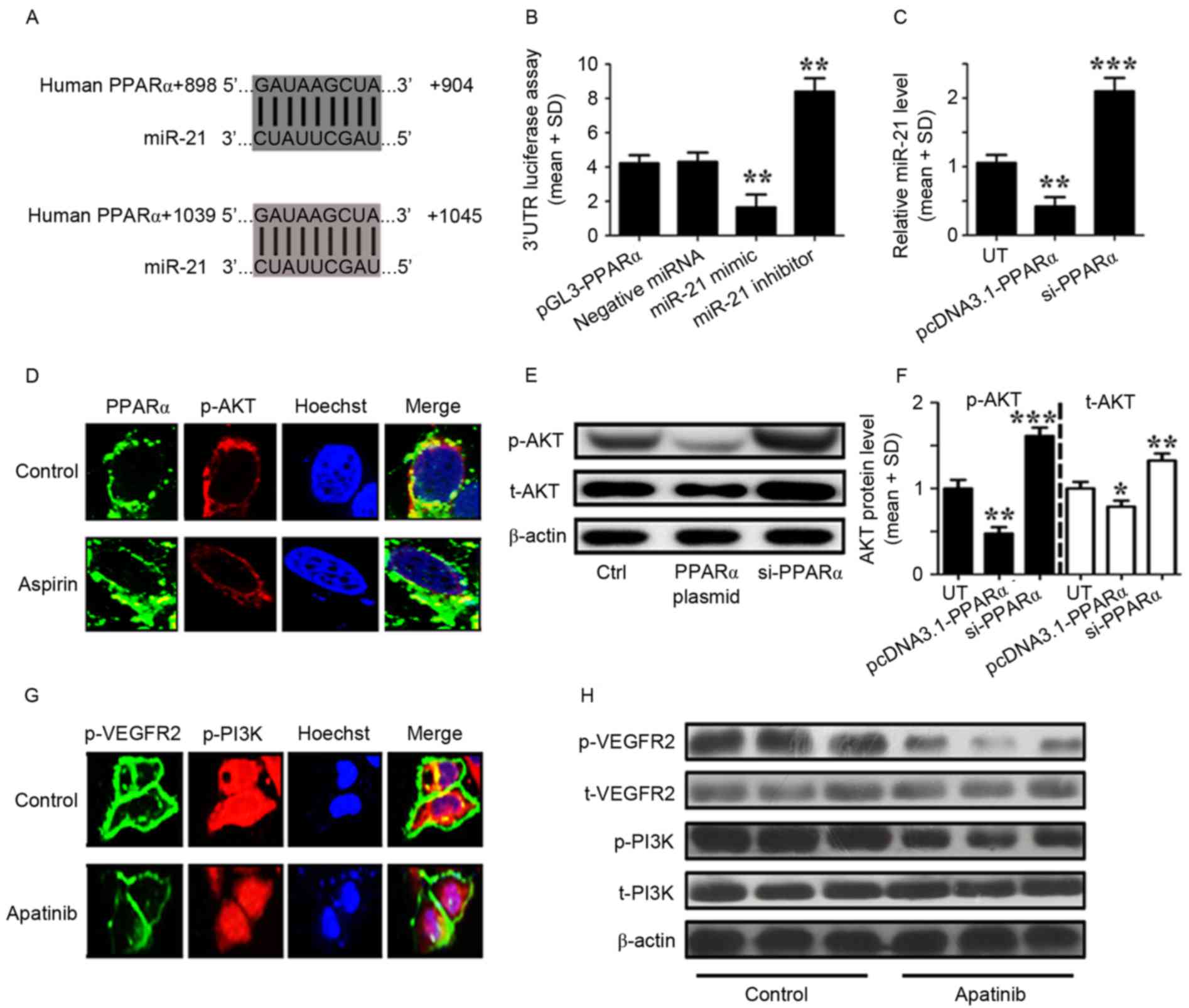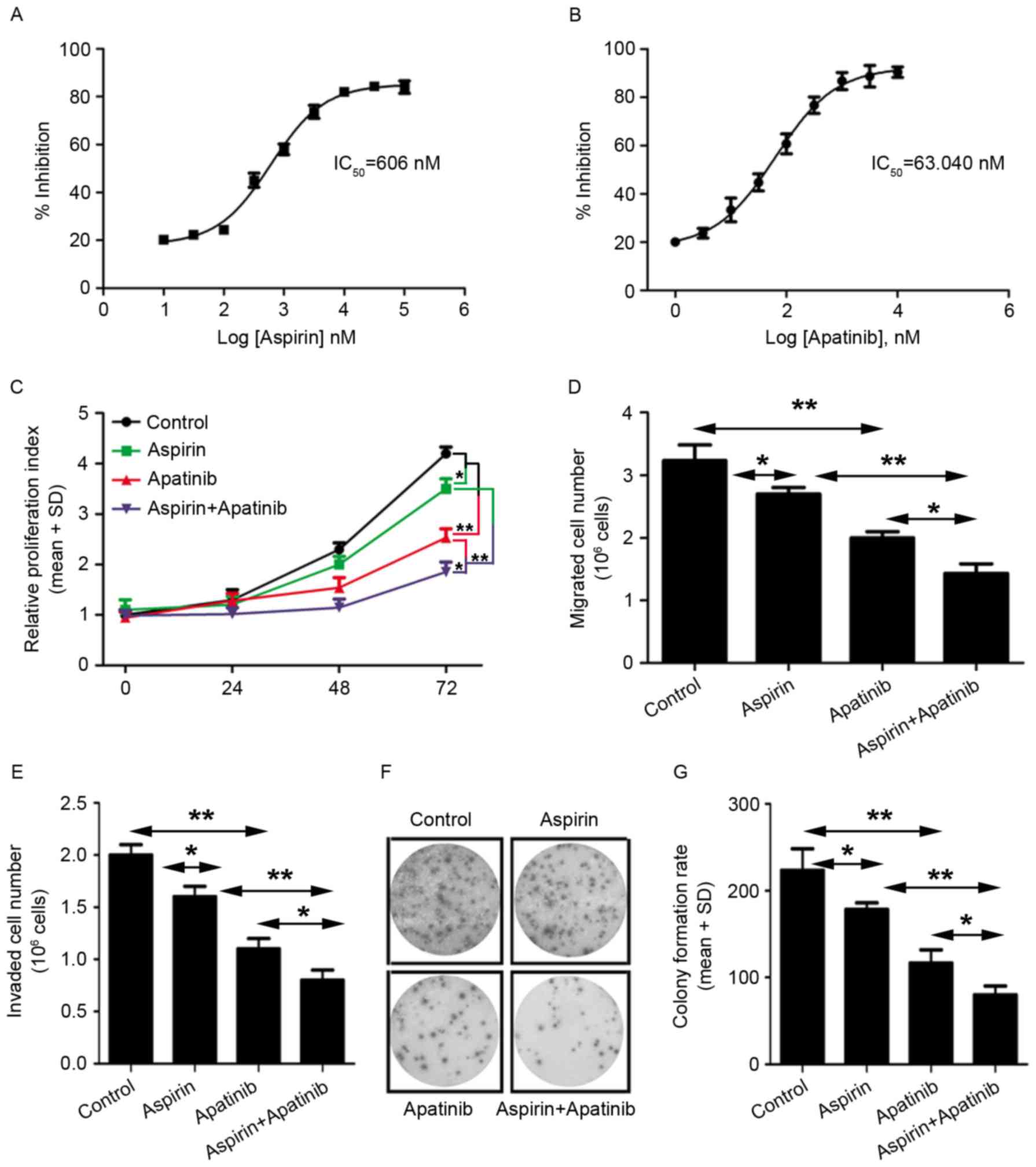|
1
|
Torre LA, Bray F, Siegel RL, Ferlay J,
Lortet-Tieulent J and Jemal A: Global cancer statistics, 2012. CA
Cancer J Clin. 65:87–108. 2015. View Article : Google Scholar : PubMed/NCBI
|
|
2
|
Wagner AD, Unverzagt S, Grothe W, Kleber
G, Grothey A, Haerting J and Fleig WE: Chemotherapy for advanced
gastric cancer. Cochrane Database Syst Rev. 17:CD0040642010.
|
|
3
|
Petrioli R, Francini E, Roviello F,
Marrelli D, Fiaschi AI, Laera L, Rossi G, Bianco V, Brozzetti S and
Roviello G: Sequential treatment with epirubicin, oxaliplatin and
5FU (EOF) followed by docetaxel, oxaliplatin and 5FU (DOF) in
patients with advanced gastric or gastroesophageal cancer: A
single-institution experience. Cancer Chemother Pharmacol.
75:941–947. 2015. View Article : Google Scholar : PubMed/NCBI
|
|
4
|
Ebos JM, Bocci G, Man S, Thorpe PE,
Hicklin DJ, Zhou D, Jia X and Kerbel RS: A naturally occurring
soluble form of vascular endothelial growth factor receptor 2
detected in mouse and human plasma. Mol Cancer Res. 2:315–326.
2004.PubMed/NCBI
|
|
5
|
Hicklin DJ and Ellis LM: Role of the
vascular endothelial growth factor pathway in tumor growth and
angiogenesis. J Clin Oncol. 23:1011–1027. 2005. View Article : Google Scholar : PubMed/NCBI
|
|
6
|
Holmes K, Roberts OL, Thomas AM and Cross
MJ: Vascular endothelial growth factor receptor-2: Structure,
function, intracellular signaling and therapeutic inhibition. Cell
Signal. 19:2003–2012. 2007. View Article : Google Scholar : PubMed/NCBI
|
|
7
|
Li J, Qin S, Xu J, Xiong J, Wu C, Bai Y,
Liu W, Tong J, Liu Y, Xu R, et al: Randomized, double-blind,
placebo-controlled phase III trial of apatinib in patients with
chemotherapy-refractory advanced or metastatic adenocarcinoma of
the stomach or gastroesophageal junction. J Clin Oncol.
34:1448–1454. 2016. View Article : Google Scholar : PubMed/NCBI
|
|
8
|
Ilson DH: Targeting the vascular
endothelial growth factor pathway in gastric cancer: A hit or a
miss? J Clin Oncol. 34:1431–1432. 2016. View Article : Google Scholar : PubMed/NCBI
|
|
9
|
Chang H, Kim N, Park JH, Nam RH, Choi YJ,
Lee HS, Yoon H, Shin CM, Park YS, Kim JM and Lee DH: Different
microRNA expression levels in gastric cancer depending on
Helicobacter pylori infection. Gut Liver. 9:188–196. 2015.
View Article : Google Scholar : PubMed/NCBI
|
|
10
|
Lin S and Gregory RI: MicroRNA biogenesis
pathways in cancer. Nat Rev Cancer. 15:321–333. 2015. View Article : Google Scholar : PubMed/NCBI
|
|
11
|
Suárez Y and Sessa WC: MicroRNAs as novel
regulators of angiogenesis. Circ Res. 104:442–454. 2009. View Article : Google Scholar : PubMed/NCBI
|
|
12
|
Liu LZ, Li C, Chen Q, Jing Y, Carpenter R,
Jiang Y, Kung HF, Lai L and Jiang BH: miR-21 induced angiogenesis
through AKT and ERK activation and HIF-1α expression. PLoS One.
6:e191392011. View Article : Google Scholar : PubMed/NCBI
|
|
13
|
Jiang FS, Tian SS, Lu JJ, Ding XH, Qian
CD, Ding B, Ding ZS and Jin B: Cardamonin Regulates miR-21
expression and suppresses angiogenesis induced by vascular
endothelial growth factor. Biomed Res Int. 2015:5015812015.
View Article : Google Scholar : PubMed/NCBI
|
|
14
|
Zhou J, Wang KC, Wu W, Subramaniam S, Shyy
JY, Chiu JJ, Li JY and Chien S: MicroRNA-21 targets peroxisome
proliferators-activated receptor alpha in an autoregulatory loop to
modulate flow-induced endothelial inflammation. Proc Natl Acad Sci
USA. 108:10355–10360. 2011. View Article : Google Scholar : PubMed/NCBI
|
|
15
|
Kersten S, Desvergne B and Wahli W: Roles
of PPARs in health and disease. Nature. 405:421–424. 2000.
View Article : Google Scholar : PubMed/NCBI
|
|
16
|
Kim JH, Kim T, Qu A and Gonzalez FJ:
Abstract 23: Nuclear receptor PPARα activation triggers hepatic
cell death in Ikkβ-deficient mice. Cancer Res. 75:232015.
View Article : Google Scholar
|
|
17
|
Aboud Abu O, Donohoe D, Bultman S, Fitch
M, Riiff T, Hellerstein M and Weiss RH: PPARα inhibition modulates
multiple reprogrammed metabolic pathways in kidney cancer and
attenuates tumor growth. Am J Physiol Cell Physiol. 308:C890–C898.
2015. View Article : Google Scholar : PubMed/NCBI
|
|
18
|
Chandran K, Goswami S and Sharma-walia N:
Implications of a peroxisome proliferator-activated receptor alpha
(PPARα) ligand clofibrate in breast cancer. Oncotarget.
7:15577–15599. 2016. View Article : Google Scholar : PubMed/NCBI
|
|
19
|
Skrypnyk N, Chen X, Hu W, Su Y, Mont S,
Yang S, Gangadhariah M, Wei S, Falck JR, Jat JL, et al: PPARα
activation can help prevent and treat non-small cell lung cancer.
Cancer Res. 74:621–631. 2014. View Article : Google Scholar : PubMed/NCBI
|
|
20
|
Planagumà A, Titos E, López-Parra M, Gaya
J, Pueyo G, Arroyo V and Clària J: Aspirin (ASA) regulates
5-lipoxygenase activity and peroxisome proliferator-activated
receptor alpha-mediated CINC-1 release in rat liver cells: Novel
actions of lipoxin A4 (LXA4) and ASA-triggered 15-epi-LXA4. FASEB
J. 16:1937–1939. 2002.PubMed/NCBI
|
|
21
|
Søgaard KK, Farkas DK, Pedersen L, Lund
JL, Thomsen RW and Sørensen HT: Long-term risk of gastrointestinal
cancers in persons with gastric or duodenal ulcers. Cancer Med.
5:1341–1351. 2016. View
Article : Google Scholar : PubMed/NCBI
|
|
22
|
Kim SS, Nam JS, Cho HJ, Won JH, Kim JW, Ji
JH, Yang MJ, Park JH, Noh CK, Shin SJ, et al: Plasma microRNA-122
as a predictive marker for treatment response following
transarterial chemoembolization in patients with hepatocellular
carcinoma. J Gastroenterol Hepatol. 32:199–207. 2017. View Article : Google Scholar : PubMed/NCBI
|
|
23
|
Zhang W and Li Y: miR-148a downregulates
the expression of transforming growth factor-β2 and SMAD2 in
gastric cancer. Int J Oncol. 48:1877–1885. 2016.PubMed/NCBI
|
|
24
|
Fontana E and Smyth EC: Novel targets in
the treatment of advanced gastric cancer: A perspective review.
Ther Adv Med Oncol. 8:113–125. 2016. View Article : Google Scholar : PubMed/NCBI
|
|
25
|
Cancer Genome Atlas Research Network:
Comprehensive molecular characterization of gastric adenocarcinoma.
Nature. 513:202–209. 2014. View Article : Google Scholar : PubMed/NCBI
|
|
26
|
Roviello G, Petrioli R, Marano L, Polom K,
Marrelli D, Perrella A and Roviello F: Angiogenesis inhibitors in
gastric and gastroesophageal junction cancer. Gastric Cancer.
19:31–41. 2016. View Article : Google Scholar : PubMed/NCBI
|
|
27
|
Tian S, Quan H, Xie C, Guo H, Lü F, Xu Y,
Li J and Lou L: YN968D1 is a novel and selective inhibitor of
vascular endothelial growth factor receptor-2 tyrosine kinase
withpotent activity in vitro and in vivo. Cancer Sci.
102:1374–1380. 2011. View Article : Google Scholar : PubMed/NCBI
|
|
28
|
Lazăr DC, Tăban S, Cornianu M, Faur A and
Goldiş A: New advances in targeted gastric cancer treatment. World
J Gastroenterol. 22:6776–6799. 2016. View Article : Google Scholar : PubMed/NCBI
|
|
29
|
Fornaro L, Vasile E and Falcone A:
Apatinib in advanced gastric cancer: A doubtful step forward. J
Clin Oncol. Aug 15–2016.(Epub ahead of print). View Article : Google Scholar : PubMed/NCBI
|
|
30
|
Luo J, Manning BD and Cantley LC:
Targeting the PI3K-Akt pathway in human cancer: Rationale and
promise. Cancer Cell. 4:257–262. 2003. View Article : Google Scholar : PubMed/NCBI
|
|
31
|
Ahmed W, Ziouzenkova O, Brown J, Devchand
P, Francis S, Kadakia M, Kanda T, Orasanu G, Sharlach M, Zandbergen
F and Plutzky J: PPARs and their metabolic modulation: New
mechanisms for transcriptional regulation? J Intern Med.
262:184–198. 2007. View Article : Google Scholar : PubMed/NCBI
|
|
32
|
Gonzalez FJ and Shah YM: PPARalpha:
Mechanism of species differences and hepatocarcinogenesis of
peroxisome proliferators. Toxicology. 246:2–8. 2012. View Article : Google Scholar
|
|
33
|
Hu X, Zhang J, Xu B, Jiang Z, Ragaz J,
Tong Z, Zhang Q, Wang X, Feng J, Pang D, et al: Multicenter phase
II study of apatinib, a novel VEGFR inhibitor in heavily pretreated
patients with metastatic triple-negative breast cancer. Int J
Cancer. 135:1961–1969. 2014. View Article : Google Scholar : PubMed/NCBI
|
|
34
|
Li J, Qin S, Xu J, Guo W, Xiong J, Bai Y,
Sun G, Yang Y, Wang L, Xu N, et al: Apatinib for
chemotherapy-refractory advanced metastatic gastric cancer: results
from a randomized, placebo-controlled, parallel-arm, phase II
trial. J Clin Oncol. 31:3219–3225. 2013. View Article : Google Scholar : PubMed/NCBI
|
|
35
|
Sweetman SC: Martindale: The Complete Drug
Reference. 37th. Pharmaceutical Press; London, UK: 2011
|
|
36
|
Algra AM and Rothwell PM: Effects of
regular aspirin on long-term cancer incidence and metastasis: A
systematic comparison of evidence from observational studies versus
randomised trials. Lancet Oncol. 13:518–527. 2012. View Article : Google Scholar : PubMed/NCBI
|
|
37
|
Rothwell PM, Price JF, Fowkes FG,
Zanchetti A, Roncaglioni MC, Tognoni G, Lee R, Belch JF, Wilson M,
Mehta Z and Meade TW: Short-term effects of daily aspirin on cancer
incidence, mortality, and non-vascular death: analysis of the time
course of risks and benefits in 51 randomised controlled trials.
Lancet. 379:1602–1612. 2012. View Article : Google Scholar : PubMed/NCBI
|
|
38
|
Rothwell PM, Wilson M, Price JF, Belch JF,
Meade TW and Mehta Z: Effect of daily aspirin on risk of cancer
metastasis: A study of incident cancers during randomised
controlled trials. Lancet. 379:1591–1601. 2012. View Article : Google Scholar : PubMed/NCBI
|


















